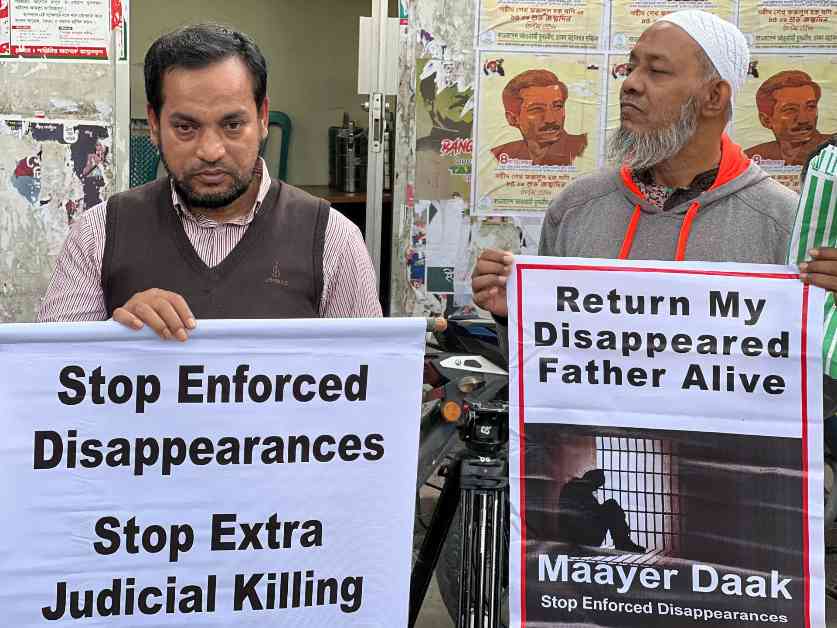The Trauma of Enforced Disappearances in Bangladesh
In the dark, enclosed space of a secret prison allegedly run by Bangladesh’s military intelligence, Michael Chakma, an Indigenous rights activist, endured five years of harrowing detention. His experience was marked by despair, as he recounted the lack of windows, the confusion of not knowing day from night, and the constant restraint of being handcuffed and shackled. Chakma’s story is just one among more than 700 individuals forcibly disappeared by Bangladeshi authorities during the 15-year rule of Prime Minister Sheikh Hasina, according to Odhikar, a prominent NGO. The fate of these disappeared individuals hangs in the balance, with 83 victims found dead and over 150 still missing.
Chakma’s abduction in 2019 near Dhaka was allegedly due to his vocal criticism of the Hasina government’s policies towards the Chakma people, the largest Indigenous group in Bangladesh. The Chakma community, predominantly Buddhist, has long been embroiled in a struggle to protect their land in the Chittagong Hill Tracts (CHT) region from encroachment by Bengali settlers. This conflict has led to a significant decline in the Chakma population in the CHT, with government-backed actions resulting in arrests, torture, extrajudicial killings, and enforced disappearances.
Prime Minister Hasina’s signing of the CHT Accord in 1997 was heralded as a landmark deal recognizing the rights of the Chakma people and promising them greater autonomy. However, Chakma and others continued to criticize the accord, particularly the ongoing military presence in the CHT region. This dissent led to Chakma’s abduction by security forces, plunging him into five years of solitary confinement in a secret prison.
The Journey to Liberation
After years of isolation and fear, Chakma’s sudden release from captivity was a moment of both relief and apprehension. Blindfolded and driven through the night to an unknown location, he braced himself for a possible “crossfire” execution, a fate he had vehemently opposed during his activism. However, to his surprise, he was set free in a forest with the simple words, “You are free.” The overwhelming sense of freedom and uncertainty mingled as he removed his blindfold and found himself surrounded by teakwood trees.
Chakma’s journey back to civilization, guided by a signpost and a passing car, culminated in a tearful reunion with his siblings at home. The emotional weight of his newfound liberty juxtaposed with the years of confinement and uncertainty he endured. His story of liberation echoes that of others who have been forcibly disappeared and released, shedding light on the trauma and resilience of those who have experienced such injustices.
The Shadow of Enforced Disappearances
While Chakma and some others have found their way back to their families, many more individuals remain missing, leaving their loved ones in a perpetual state of anguish and uncertainty. Families like that of Ataur Rahman, a member of the opposition Bangladesh Nationalist Party, continue to wait for any news of their missing relatives. Rahman’s wife, Nadira Sultana, stands with her children in a painful limbo, clinging to the hope that their father will return one day.
The plight of families like Sultana’s is a stark reminder of the lasting impact of enforced disappearances on individuals and communities. The recent signing of the International Convention for the Protection of All Persons from Enforced Disappearances by Bangladesh’s interim government signals a step towards addressing these grave injustices. However, the road to justice and closure for the families of the disappeared is long and arduous, requiring transparency, accountability, and a commitment to truth and reconciliation.
As Bangladesh navigates its post-Hasina era under an interim government led by Muhammad Yunus, the fate of forcibly disappeared individuals hangs in the balance. The scars of enforced disappearances run deep, leaving a legacy of trauma, grief, and unanswered questions. The stories of survivors like Chakma and the ongoing struggles of families awaiting the return of their missing loved ones serve as a poignant reminder of the human cost of political repression and state violence.


























